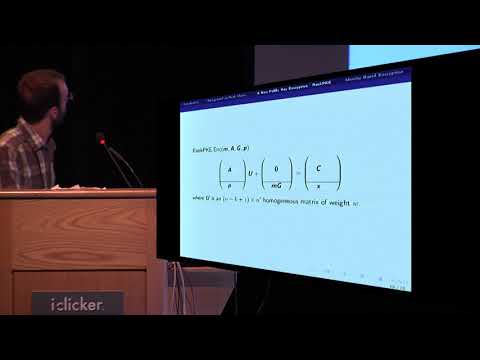Welcome to the resource topic for 2017/514
Title:
Identity-based Encryption from Codes with Rank Metric
Authors: Philippe Gaborit, Adrien Hauteville, Duong Hieu Phan, Jean-Pierre Tillich
Abstract:Code-based cryptography has a long history, almost as long as the history of public-key encryption (PKE). While we can construct almost all primitives from codes such as PKE, signature, group signature etc, it is a long standing open problem to construct an identity-based encryption from codes. We solve this problem by relying on codes with rank metric. The concept of identity-based encryption (IBE), introduced by Shamir in 1984, allows the use of users’ identifier information such as email as public key for encryption. There are two problems that makes the design of IBE extremely hard: the requirement that the public key can be an arbitrary string and the possibility to extract decryption keys from the public keys. In fact, it took nearly twenty years for the problem of designing an efficient method to implement an IBE to be solved. The known methods of designing IBE are based on different tools: from elliptic curve pairings by Sakai, Ohgishi and Kasahara and by Boneh and Franklin in 2000 and 2001 respectively; from the quadratic residue problem by Cocks in 2001; and finally from the Learning-with-Error problem by Gentry, Peikert, and Vaikuntanathan in 2008. Among all candidates for post-quantum cryptography, there only exist thus lattice-based IBE. In this paper, we propose a new method, based on the hardness of learning problems with rank metric, to design the first code-based IBE scheme. In order to overcome the two above problems in designing an IBE scheme, we first construct a rank-based PKE, called RankPKE, where the public key space is dense and thus can be obtained from a hash of any identity. We then extract a decryption key from any public key by constructing an trapdoor function which relies on RankSign - a signature scheme from PQCrypto 2014. In order to prove the security of our schemes, we introduced a new prob- lem for rank metric: the Rank Support Learning problem (RSL). A high technical contribution of the paper is devoted to study in details the hardness of the RSL problem.
ePrint: https://eprint.iacr.org/2017/514
Talk: https://www.youtube.com/watch?v=pb1ugpt3uGM
See all topics related to this paper.
Feel free to post resources that are related to this paper below.
Example resources include: implementations, explanation materials, talks, slides, links to previous discussions on other websites.
For more information, see the rules for Resource Topics .
